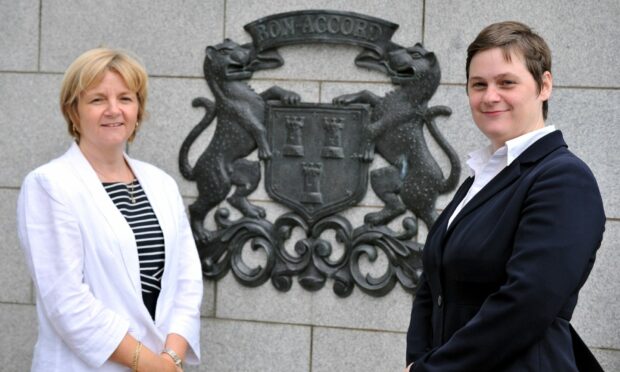Significant improvements in Aberdeen’s schools and social housing system are needed as quickly as the city council can deliver them to lift more citizens out of poverty.
The warning from the Scottish local government spending watchdog comes amid fears of more than 10,000 redundancies in the city following the decline in oil and gas combined with the pandemic.
Last night, they reiterated “real reasons to be optimistic” despite that forecast from the council’s own analysis.
The Accounts Commission has carried out its five-yearly audit of the local authority, praising the way bosses have navigated the Covid-19 pandemic, while managing to balance the books making £125 million in cuts by April 2023.
But serious concerns have been raised after auditors revealed satisfaction in the city’s schooling is among the lowest in Scotland – sitting 27th in the league table of the country’s 32 councils.
The poverty-related attainment gap, affecting pupils in Aberdeen’s most deprived areas, remains one of the widest in the country.
On top of that, council performance on another key service – housing – falls short of average national standards too, including on tenant satisfaction.
Elma Murray, Accounts Commission interim chairwoman, said: “The council must address its underperforming education and housing services.
“The reason these are so important is they can make serious inroads to tackling inequalities.
“To make the city a fairer and better place for more of the population it’s important the council addresses these two big services and makes sure they are improving them.
“And when you look at their performance across a whole range of other areas, there is no reason why they cannot do that. They have the makings of doing it.”
Otherwise, she added, it was “a very positive report for the council”.
Council leader: Internal evidence at odds with audit findings
Work is already underway within the local authority to bring about change for the better, though – especially with schools – progress can be hard to see quickly.
Council leader Jenny Laing said: “Our own internal analysis, supported by information in the current education improvement plan and self-evaluation process, indicates we are currently on a trend of increasing attainment and with visible closing of the attainment gap between our most and least deprived pupils, and we look forward to sharing those results in due course.
“Despite decreasing performance in housing repairs and antisocial behaviour we remain above national average in these areas, while our performance in homelessness services is sector leading.
“However, we cannot be complacent, and are working closely with staff on a service redesign that will bring much needed benefits for our tenants and our own teams.”
The change within the housing service has proven controversial itself, with union members going on strike earlier this month over the merging of job roles which would leave them at “breaking point”.
Auditors praised work to fill the majority of 100 teaching vacancies in the city’s schools recorded at the time of the last review.
However, leader of the main opposition group on the council, Alex Nicoll of the SNP, slammed Mrs Laing and her coalition colleagues, telling us: “Housing and education are the two biggest functions of the council.
“Both Labour and the Tories should be ashamed that, after nine years of administration, they’re being told they need to make substantial improvements on schools and housing.”
Chief watchdog: ‘Very positive report for the council’
But, the Accounts Commission was clear in its approval for how the council has been steered through the pandemic.
Around 1,600 staff voluntarily transferred to take up temporary jobs to aid the Covid effort between April and September.
A total of 158 people switched to roles of critical importance while another 424 pitched in at education and childcare hubs over school holidays – while the shift online meant access was maintained for many service users.
The controversial reorganisation at the Town House also was hailed a success too, as the authority looks “on track” to meet its £125m savings target through adoption of digital technology and moves to cut nearly 400 jobs.
Another £131m is being targeted in cuts in the next seven
years as part of the “major transformation programme,” the report said.
Mrs Laing added: “We have demonstrated significant improvements in key areas since the 2015 best value report, anchored by organisational restructuring and sound financial stewardship – helping the council deliver major building projects at pace, vital public services within budget, and at the same time make significant savings without impacting on local services.
“At the same time we recognise that there are areas of operation that require focus and we have been taking steps to address this through service redesign and other measures.”
Chief executive Angela Scott proudly hailed the innovation at the award-winning local authority, admitting hard work was needed to make improvement in the housing and education services as highlighted by the auditors.
‘Real reasons to be optimistic’ – despite risk of 10,000 Aberdeen redundancies
And a for the threat of 10,000 job losses due to the cliched “perfect storm” of the oil and gas decline and the pandemic, leaders at the Aberdeen And Grampian Chamber Of Commerce are keen to put across a more positive vision.
Policy manager Shane Taylor told us: “There is little doubt the north-east was hit hard by the Covid-19 pandemic however stabilisation in the oil price, combined with government partnering with industry to deliver initiatives like the North Sea transition deal and the energy transition fund which are making sizeable investments to ensure that the north-east of Scotland leads the global energy transition, are real reasons to be optimistic.
“The chamber’s recent oil and gas survey found that 49% of contractors expect their total workforce to increase over the next 12 months, with only 6% expecting a reduction – a significant reversal from the height of the pandemic.
“A recent report from Robert Gordon University also highlighted the opportunity if we manage the transition well, with the potential for up to 40,000 additional jobs to be created across the UK’s offshore workforce by 2030.”
Calls for translation service for those not fluent in ‘council-ese’
And, there is potential good news to come for those who struggle with council-ese: be that difficulty in telling their local outcome improvement plans from their socio-economic recovery plans, or their city centre masterplans from their local development plans.
Another of the recommendations from the commission was for the local authority to make it easier to understand the work being done, and how it compares with other councils.
Ms Murray added: “I think the council could do more to explain to its residents what it is doing to improve and what has been done – to build back confidence in the council and the city.
“They should try to produce simpler information that gives an overview of the city as they start to look to future – that would be really positive.”


